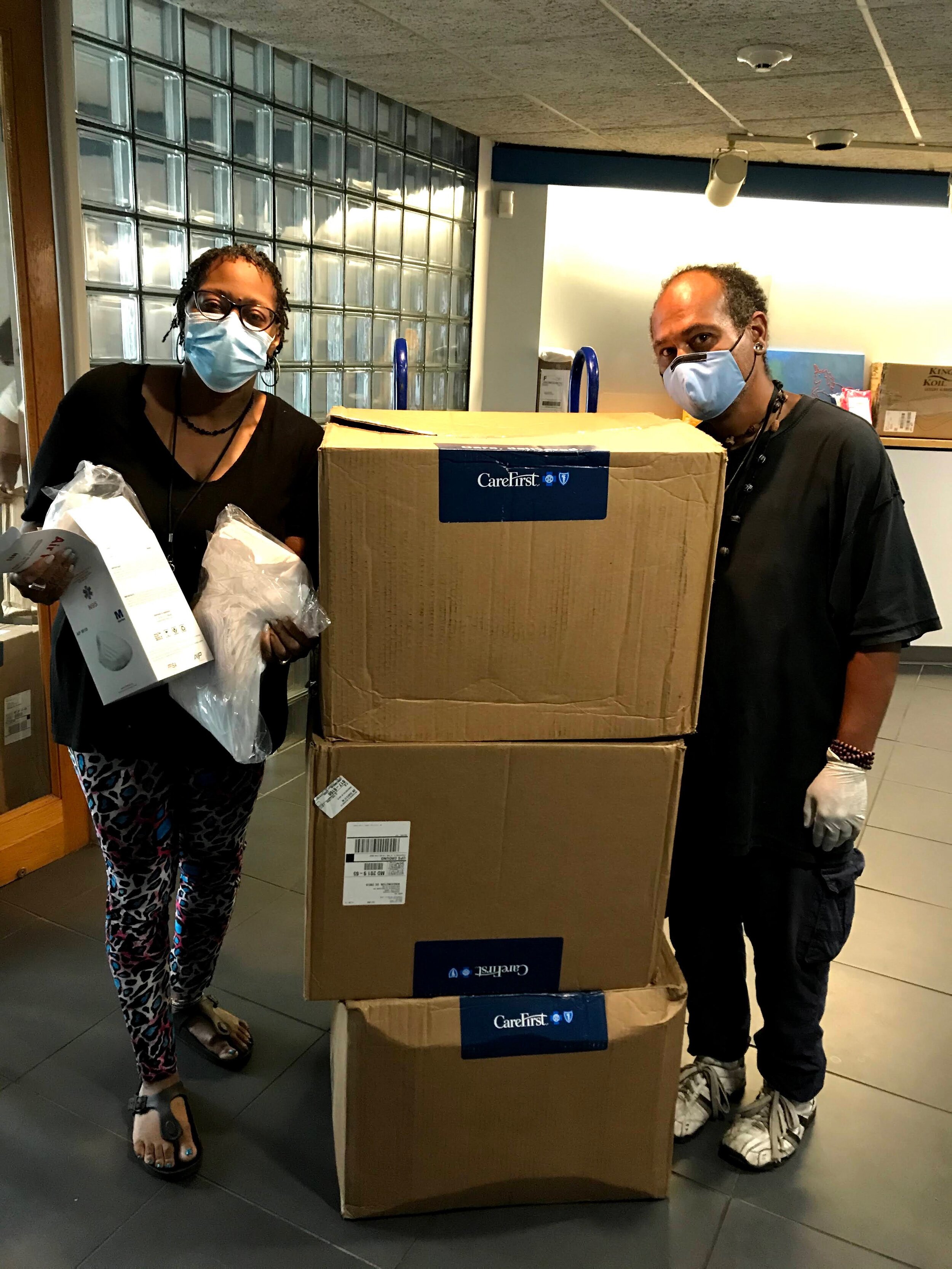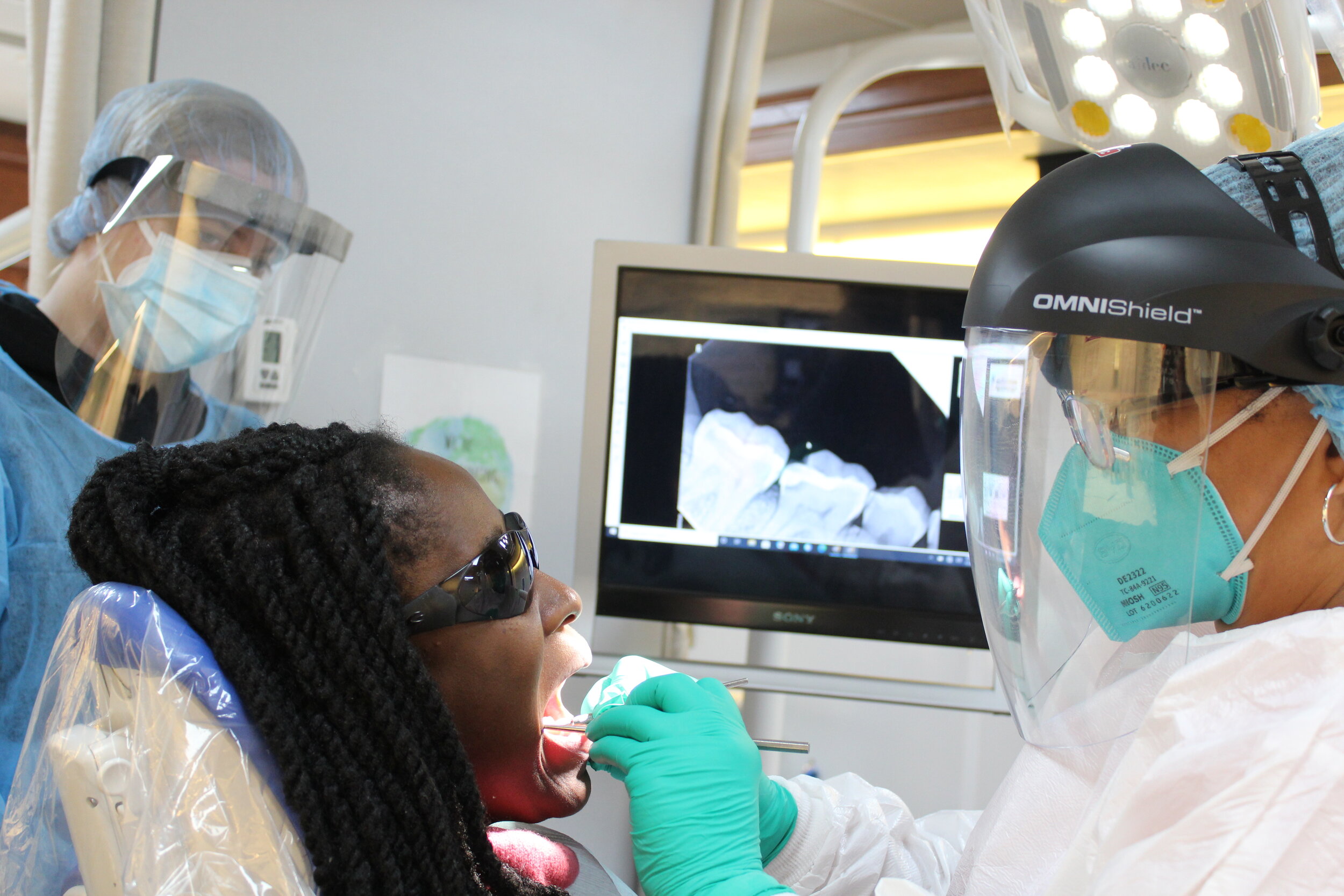The small business sector is a key economic driver in Prince George’s County; it makes up 95% of all businesses in the County. Unfortunately, Prince George’s County was hit hard by the pandemic.
50% of the jobs created over the past five years were lost in the first two weeks of COVID-19.
Many businesses have shuttered and far too many have closed for good, taking the jobs they’ve created with them. These losses have left individuals, families and communities struggling to survive and gain an economic foothold.
Helping residents improve their social and economic status is an important yet complex goal—and that’s exactly what the Greater Washington Community Foundation is doing as part of its new focus on equity and economic mobility in Prince George’s County.
The Legacy Fund, seeded with a $1 million gift directed by Sam Brin and a $10,000 gift from Meridiam, provides critically needed access to capital for small businesses in Prince George’s County. It provides direct relief to small businesses in Prince George’s County impacted by COVID-19 to help minimize vulnerability to closure and to enable small businesses thrive.
The Legacy Fund is helping blunt the impact of business closure and job loss with grants ranging from $2,000-$10,000 to 173 small businesses. These investments resulted in the retention of more than 650 full time jobs and provided the funding that businesses need for technology and other business enhancements. Additionally, through our partnership with FSC First, these companies can access technical assistance to help them better navigate new business and economic realities and ensure long-term development.
Grants were awarded to companies in all nine Councilmanic Districts in the County and across multiple industries including retail, IT, business services, restaurants, and health, beauty and fitness. While each of the companies we’ve invested in supply critical goods and services, they’re also community gathering spaces and are important institutions in the County.
Below are a few examples of small businesses that received grants and how they play a critical role in our community.
Spiritual Essence Yoga, in Upper Marlboro, has supported the mental, physical, and emotional health of the Prince George's County community since 2008. While the stress of the pandemic has increased the community’s need for these services, the company was required to close for several months. This grant helped them reopen and begin offering virtual and in-person classes.
BLE Executive and Virtual Office Suites, in Largo, provides individual offices and virtual services to hundreds of entrepreneurs and small businesses in the County through a flexible office space business model. With more people working from home, and in-person meetings no longer an option, BLE has had to contend with reduced demand for its services. This grant will enable BLE to maintain critical staffing levels and continue to provide the high quality business to business services that are important for the growth and sustainability of small businesses and entrepreneurship.
Minimizing business closure and reducing job loss are important goals of the Legacy Fund, but we also recognize that in order to work families need childcare. The staff at Loving Hands Enrichment Center, a childcare facility in Clinton have cared for children in the community for 14 years. Like most companies, they’ve been forced to scale back due to the pandemic. Funding is helping the center retain staff and improve their operating systems. They are, once again, providing a strong educational and nurturing environment for child development in Prince George’s.
2020 Legacy Fund Grant Awardees
21st Century Expo Group
4EVER 2012 Corporation
Acbles Adrian Wilcox Agency, Inc.
Adventure Tours Aga Group
Aggie Family Child Care
Airport Metro Connection Inc.
Angarai Management Services
Appreciation Moments
Around the Clark Trucking
Ayers Natural Aztlan, Inc.
BC Tours & Travel, Inc.
Bea's Hive Assisted Living
Behind The Scenes Production
Belmont Executives, Inc.
Beltway Trophy Co.
Best Sweet Frog
Biruk Chewaka
BizyBee Professional Staffing & Biz'Ness Solutions
BLE Executive & Virtual Office Suites
Bright Horizon Ventures
Bruce T. Blake Insurance Agency, Inc.
Cameau Enterpises dba Camp Space
Centered Support
Charlene Mitchell
Cheerful Speech Therapy
Choice Clinical Services
Chung & Oh
Cipher Logix, Inc.
Clearview Optics dba Sterling Optical
CN Accounting & Management Consulting
College Park Yoga dba Numi Yoga
Colors by Tangie
Corporate Wheels
C-Pup Pet Walks
Cursor Logistics
Custom Plumbing and HVAC
Cuts Unlimited, Inc.
Cybersoft Technologies Corporation
Cynthia Cephas Photography
DAPO Group
DC Vegan
DCG Construction
Deanna Robinson Fitness
Defined by Design Events
Dickey & Associates
DMV Healthy Insurance
DNA Fitness, Inc. dba Curves of Glenn Dale
DSSP Consulting, Inc.
DXT Therapeutic Services
DY Food Wholesalers
Dynamic 3, Inc.
Dynamic Technical Solutions One
Eby Health Services, Inc.
Elites Care
Emmanuel Management Enterprise, Inc.
Envisage Management Solutions
Eric Kruszewski
Essentially Everything Events
Exact Financial Services
Executive Electrolysis, Inc.
Expressions of Faith
Extra Mile Logistics
Felicia C. Everett Insurance Company, Inc.
Femsterimages Productions
First Lady
Fitness Martial Arts
Flavors Culinary Group
Forty Winks
Front Street Management
G&D Construction
Garcia's Investments
Goins Worldwide, Inc.
Goldleaf Academy
Green Ivy, Benefit
Greenbelt Barber and Beauty Shop
Greenbelt Foods
GS Consulting and Communications, Inc.
Hair + Space Blowdry and Beauty Company
Harbor Wines
Hawkeye Medical
Higher Ground Transportation Services, Inc.
Hutchinson Design Group
Innovations 2000
Intuitive Group
Iwynn Productions
J and A Transport
J.D Clark Professional Services
Jiivana-LIFE Yoga & Wellness LLC dba Spiritual Essence Yoga
K&W Plumbing
KBM Realtors
KC Enterprise
Kery's dba Christina O Salon & Spa
KIK, Inc.
Kimi Nails & Spa
Kinetic Solutions
Klub Kid
Lamaha Hospitality
Laugh House
Law Offices of Sharon Theodore-Lewis & Associates
Legacy Partners Distribution
LG Total Fitness/Triple Delight Aquatics
LLF Handyman Services
Lord & Mitchell, Inc.
Lovi Family Daycare, Inc.
Loving Hands Enrichment Daycare
Maryland Carpet Repair & Cleaning
Maryland Physical Therapy and Wellness Center
Melton Digital
MF Communications Trade, Inc.
Min Wireless, Inc.
Mixin' Mimi Mixology
My Wealth Store
Neshama, Inc.
NITDOT
N'Style Hair Grooming Barber and Salon
Old Town Hospitality
Oni Family Day Care
Own Your Own DMV
PG Family Dentistry
Physical and Sports Rahab, Inc.
Premier Eye Care Center
Prince of Peace Homes for Seniors, Inc.
Printing Express & Designs
Pro Spex, Inc.
Prominent Solutions, Inc.
Quality Time
QW, Inc.
R.A. Investments
Regina Robinson Enterprises
Rickenbacker's Preparation Services
Roman Mechanical
Salon 809
Seeram Enterprises
SELA Hair and Nails
Shan's Jumping Gymnasium
Sidnea Global Enterprises, Inc.
Silver Canady & Associates
Sky Nails
SLDB
SNR Holdings dba Misfit Winery
Something Vintage Rentals
SRC Eldercare Services
Sutter Design, Inc.
Tajick Dental Clinic PC
TCH Enterprize
Team Power Linx
TechOpps, Inc.
Temple Hills Swim Club, Inc.
The Face Paint Ladyn Inc.
The Groom Room
The Joseph Company
The Mercy Law Firm
The Mobile Experience
The SEMCAS Group
The WaterHole
Total Interior
Toth Distribution Service, Inc.
Transcend Solutions
Tucker Moor Law Group
Turning Point Solutions
University for Tots-Suitland Child Care Center, Inc.
viaJ Entertainment Services
Vino 301 Wine Concierge
VIP Financial Services
Visage Dermatology and Aesthetic Center
Way To Live Initiative
Wills Trucking & Excavating, Inc.
World View Early Learning Center, Inc.
Youth Avenue Solutions
About the Legacy Fund
The Legacy Fund made a big difference for 173 businesses on the brink of closure. It’s a key part of our effort to build thriving communities and help individuals and families in Prince George’s County build wealth and leave a legacy for generations to come.
For more information about our work in Prince George’s County, visit www.thecommunityfoundation.org/princegeorges.

























